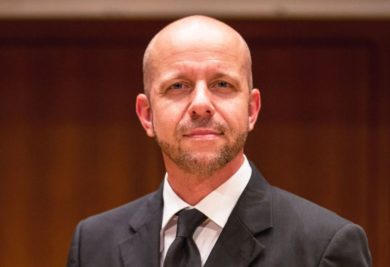Bass leads Seraphic Fire in a rich and rewarding program of music for male voices

James K. Bass conducted the men of Seraphic Fire Wednesday night at St. Sophia Greek Orthodox Cathedral in Miami.
James K. Bass, Seraphic Fire’s associate conductor is a superb director of choral music. With restrained, purposeful gestures, Bass can draw a vast range of dynamics and sonority from his singers and capture the idiomatic sense of every work he leads.
On Wednesday night at St. Sophia Greek Orthodox Cathedral in Miami, Bass led a program that, even by Seraphic Fire’s standard, was highly innovative and adventurous. Comprising a varied array of scores for male chorus, the repertoire spanned centuries and musical styles. The evening proved musically fascinating and enriching, offering much wonderful music one is not likely to normally encounter.
The moving Ukrainian hymn Boze Veliki, arranged by Bass, opened the evening with the deeply sonorous low voices resounding throughout the sanctuary. Without pause, Grieg’s “Brothers, Sing Out” formed a joyous contrast, the twelve-member choir rousing in full-voiced exclamation.
The second part of Thomas Tallis’ Lamentations of Jeremiah offered Renaissance polyphony in full glory. Both spare and complex, Tallis’s setting still astonishes in its originality and depth of feeling. Under Bass’s direction, the contrapuntal writing emerged distinctly and the purity and clarity of articulation by the high voices was especially beautiful, emerging in rounded tones in the domed cathedral.
“Be Still My Soul,” the English-language version of the “Finlandia Hymnen,” was sung with reverent emotion. Set to the main theme of Sibelius’ famous tone poem, the hymn can easily seem over-weighted but Bass’s forthright tempo was totally apt, avoiding heaviness and sentimentality. Superb blending of the evenly balanced voices produced a luminous sound palette.
The music of Armenian composer Komitas Vardapet comes from a very different world and aesthetic. Three selections from Vardapet’s Armenian Divine Liturgy are deeply related to the Russian Orthodox choral tradition.
Andrew Crane’s declamation in “Khorhood Khorin” was thrilling, his tenor strong with real ping and strength at the top. The dissonant modernism of that initial movement was calmed by the hymn-like “Marmin Deroonnakan” and the sacred anthem “Soorb, Soorb.” This difficult music, seemingly from another world, was splendidly paced by Bass, drawing the listener in. In both Vardapet’s opus and Pavel Chesnokov’s more familiar “Salvation is Created,” the splendid corporate vocalism could hardly have been bettered.
Introducing two rarely heard pieces by Schubert, Bass noted that the tenors were required to sing softly which, he said jokingly, tenors are not noted for doing. In “Grab und Mond,” the Seraphic tenors did sing quietly to telling effect, with the entire choir probing the depths of emotion, skillfully controlled by Bass. The men seemed to resound as a single voice in “Die Nacht.” This example of typical Schubertian lyricism was spun in flowing lines appropriate to the song’s description of heavenly peace and silence.
The evening offered three world premieres, two of those coming from young composers associated with Seraphic Fire’s educational program in association with the University of Miami’s Frost School of Music Melissa D’Albora’s A Fantasy explored spatial harmonics while Sydney Doemel’s Again it is September was an admirable example of choral minimalism.
Viaje by Ilana Perez Velázquez, a professor at William College, mixes high melodic strains with an underlying Latin pulse. All three scores evidenced a sure command of writing for the voice and the performances presented each score at their best. Douglas Dodson’s countertenor was especially striking on these works. Often singing solo lines in the top register over the massed voices, Dodson’s tonal warmth, agility and expressive intensity were remarkable.
The vocal music of Francis Poulenc is very special, inhabiting a highly personal soundscape. Quatre petites prières de Saint Francois d’Assise, composed during World War II, speaks with aching fervor of the saint’s prayers for acceptance and love with a subtext of hope and peace. These concise, Gallic proclamations of faith range from experimental harmonies to bold outbursts and the grace of a chanson. Tenor Brad Diamond’s exquisite timbre and bass Eric Alatorre’s firm low range stood out in a vividly and well coordinated reading.
The program concluded with the melodic richness of Franz Biebl’s “Ave Maria” which reached soaring heights. Blake Beckemeyer’s light tenor and Steven Eddy’s sturdy bass took solo honors in a reading in which the gorgeous melodic strands matched the beauty of the singing.
Bass told the audience that the previous time that the choir presented a program of works for male singers, the concert was not good. This time the music chosen and performances were outstanding. There are four remaining performances of one of the most unique offerings ever essayed by Miami’s stellar chamber choir.
Seraphic Fire repeats the program 7 p.m. Thursday at Vanderbilt Presbyterian Church in Naples; 7:30 p.m. Friday at St. Philip’s Episcopal Church in Coral Gables; 7:30 p.m. Saturday at All Saints Episcopal Church in Fort Lauderdale; and 4 p.m. Sunday at All Souls Episcopal Church in Miami Beach. seraphicfire.org
Posted in Performances
Leave a Comment
Thu Mar 24, 2022
at 12:25 pm
No Comments